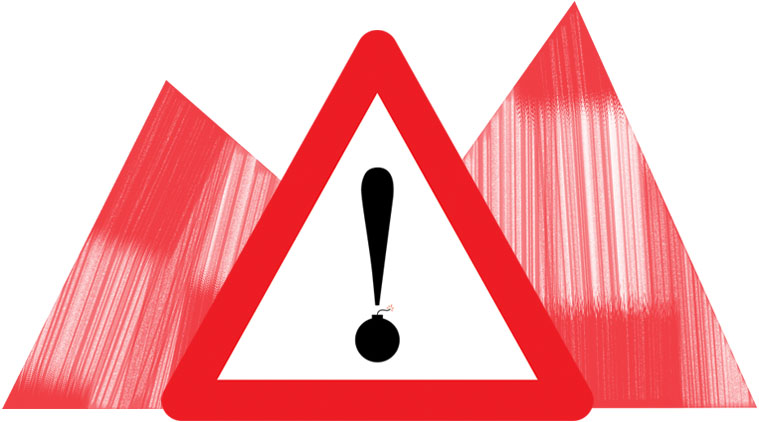J&K and the AfPak hyphen
US-Taliban engagement in Afghanistan has emboldened groups like Jaish and Lashkar-e-Taiba. The jihadist project has also been helped by the political vacuum in the Valley.

In 2008, candidate Barack Obama angered India by suggesting that the road to peace in Afghanistan ran through Kashmir. He made the case in several interviews before his election as US President that if India and Pakistan would only resolve their differences, the Pakistan army would be more inclined to heed the American call to go after its assets in Afghanistan. Some months later, when President Obama appointed Richard Holbrooke as the Special Envoy for India, Pakistan and Afghanistan, India lobbied with determination to keep itself from being hyphenated with Af-Pak, and succeeded in keeping itself out of Holbrooke’s mandate.
Almost exactly a decade later, as security experts piece together Thursday’s devastating suicide attack on a CRPF convoy at Awantipora on the Jammu-Srinagar highway, it appears as if that hyphenation may have returned to haunt India, albeit in a different way.
In a pre-recorded video released by Jaish-e-Mohammad (JeM), the group that claimed responsibility for the attack, the Kashmiri youth at the wheel of the car bomb seemed to suggest that he had been inspired by the “success” of the Taliban over US forces in Afghanistan. Reports in this paper have shown that even before the US began pushing a peace deal with the Taliban, three years ago, youth in South Kashmir spoke of how the Taliban’s “victory” over US forces had showed them that they too could “defeat India”. As the US-Taliban engagement gathers pace, and Pakistan claims bragging rights for bringing them together, the emboldening of the jihadist project in Kashmir, and of Pakistan-based fellow travellers of the Afghan Taliban such as JeM and Lashkar-e-Taiba (LeT), is something India has to be ready for.
The links between the JeM and the Taliban are well-known. On October 2001, when the JeM was listed under UNSC1267, the reasons given were that it was “participating in the financing, planning, facilitating, preparing or perpetrating of acts or activities by, with, under the name of, on behalf or in support of, supplying, selling or transferring arms and related materiel to or otherwise supporting acts or activities of al-Qaida, Usama bin Laden and the Taliban”. According to the UNSC, al Qaeda, Taliban and other extremist organisations provided finances to Maulana Masood Azhar to set up the JeM. As a member of the Harkat-ul-Mujahideen, Azhar had also fought in the first Afghan war, and the JeM is believed to have participated in Taliban operations against US forces.
After it came into existence in 2000, it was active in the Kashmir Valley for a couple of years, and in 2001 carried out a massive suicide attack with a car bomb, similar to Thursday’s strike, at the Jammu & Kashmir assembly. But the JeM lost favour with the Pakistan army, which was under US pressure after 9/11, and the group then turned against its patrons, twice even attempting to assassinate then military ruler General Pervez Musharaff.
Its comeback to the Valley in 2015 coincided with the taking shape of a new, indigenous militancy in J&K, which had its origins in the 2008 Amarnath land row, followed by the 2010 anti-Machil protests, and the 2012 hanging of Afzal Guru. Its operations since then have included the terrorist strike at Pathankot Air Force base and the attack on the Uri Brigade headquarters. The unrest in the Valley since the 2016 killing of Hizbul Mujahideen militant, Burhan Wani, gave the JeM the foothold it had been looking for since 2001. Some of the confidence and triumph of the Taliban, which is hoping to make a comeback in Kabul by the middle of this year, is sure to rub off on its friend JeM as well as the LeT.
At this moment, it is all too easy for politicians to demand and promise revenge against Pakistan, but any military adventurism could have unforeseen, unintended consequences. The post-Uri surgical strike exposed the military limitations of that particular instrument. It brought no positive changes. Instead, the LoC remained hot, and Indian civilians and soldiers continued to die. Any military operation would have to go beyond the surgical strike, even for political optics, and it may still not achieve any strategic objectives. Worse, it may spin out of control. What worked in the government’s favour in September 2016 was that Pakistan chose not to respond militarily. In fact, it even denied there had been any military operation of the kind that the Indian Army announced it had undertaken across the Line of Control. It may not be the same again.
At this moment, it is all too easy for politicians to demand and promise revenge against Pakistan, but any military adventurism could have unforeseen, unintended consequences. The post-Uri surgical strike exposed the military limitations of that particular instrument. It brought no positive changes. Instead, the LoC remained hot, and Indian civilians and soldiers continued to die. Any military operation would have to go beyond the surgical strike, even for political optics, and it may still not achieve any strategic objectives. Worse, it may spin out of control. What worked in the government’s favour in September 2016 was that Pakistan chose not to respond militarily. In fact, it even denied there had been any military operation of the kind that the Indian Army announced it had undertaken across the Line of Control. It may not be the same again.










.png)




























No hay comentarios:
Publicar un comentario